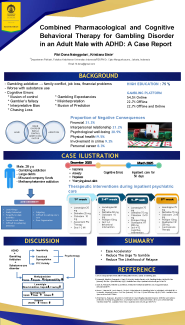Combined Pharmacological and Cognitive Behavioral Therapy for Gambling Disorder in an Adult Male with ADHD: A Case Report

Background
Individuals who experience gambling addiction often face problems in family relationships, job loss, and financial difficulties. Gambling problems worsen when accompanied by substance use.
Case Presentation
A 28-year-old man was brought to the Emergency Department by his family because he was unable to control his gambling behavior. The patient had a large amount of debt and had used company funds for gambling. While gambling, he used methamphetamine to boost his confidence when placing bets and to help him stay awake throughout the night. He is currently feeling sad, hopeless, anxious, and has suicidal thoughts.
Management
During hospitalization, the patient received both pharmacological and non-pharmacological interventions. One of the non-pharmacological therapies provided was Cognitive Behavioral Therapy (CBT).
Result
The patient reported feeling calmer after treatment, with a reduced urge to gamble. He was able to redirect his gambling urges toward engaging in productive activities. Feeling of sadness and anxiety decreased and urge to end his life disappeared
Discussion
Cognitive Behavioral Therapy has been proven effective in treating gambling addiction. Patients with gambling addiction have cognitive errors that drive them to gamble repeatedly despite its negative impact on family relationships and finances. Through CBT, patients are able to identify irrational beliefs, undergo cognitive restructuring, and develop skills to manage gambling urges in triggering situations. Research shows that 60% of patients experienced a reduction in gambling activity after undergoing CBT. CBT has been shown to be effective in increasing patients’ awareness of gambling triggers, thereby helping prevent relapse.
Keywords: gambling, addiction, cognitive behavioral therapy
